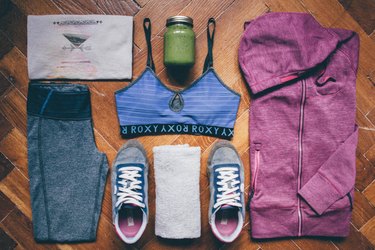
With a great workout often comes a lot of sweat. And nothing feels better than a post-workout shower. But it's not just your body you need to clean after a good sweat session. You need to wash workout clothes after each use, too. Here's how to keep your workout clothes so fresh and so clean, without ruining them in the process.
How Often Should I Wash Workout Clothes?
Video of the Day
No getting around this one: You'll need to wash those sweaty gym clothes after each workout — no exceptions, says Jennifer Landa, MD, a gynecologist and chief medical officer at BodyLogicMD.
Video of the Day
If you don't wash your gym clothes after each workout (especially the pieces that comes in contact with your crotch, like leggings or shorts), Landa says, you could upset the pH levels in your vagina. This could make you more prone to yeast infections and bacterial infections.
"Besides the possible bacterial growth and infections dirty laundry can cause, you may also just stink," says personal trainer and founder of Love Sweat Fitness Katie Dunlop. (You don't want to be that person at the gym!)
"When you sweat, your sweat glands release proteins and lipids," Dr. Landa says. Those, combined with the bacteria that live on your skin, cause less-than-pleasant odors.
As for shoes? Those can go without a wash for about a month.
Read more: How to Find the Best Workout Clothes for You
What Detergents Should I Use for Workout Clothes?
When washing gym clothes, choose a fragrance-free detergent. "Using detergents with fragrance and other irritating agents can disturb the pH of the vagina," says Dr. Landa. That can increase the risk of bacterial vaginosis and candidiasis [yeast].
Using detergents with dyes and perfumes on gym clothes can also lead to irritated skin, particularly on the nether regions. "The area in the groin and perineum are often affected since this is an area where the clothing comes into close and direct contact for many hours," says New York-based gynecologist Karen Brodman, MD. That's why it's important to wear dry, loose-fitting undergarments and to take off sweaty gym clothes as soon as possible.
Two detergents you may want to try are Seventh Generation Free & Clear and Tide Free & Gentle, both of which can be found in at major retailers like Target and Walmart.
Which Wash Cycle Should I Use for Workout Clothes?
"The best cycle would depend on the workout wear and your tolerance for replacing it," says Dr. Landa. "I would recommend a more aggressive cycle to get rid of sweat and odors, but this could cause your workout wear to become damaged over time and require replacement sooner," she says. So consider how often you're willing to replace your gym clothes.
Ultimately, your best bet is to check the label and follow instructions for each specific article of clothing, as requirements vary based on material. For example, gym clothes with polyester material are especially prone to bad odors, according to a 2014 study in American Society for Microbiology. So those garments require a particularly strong cycle.
Should I Put My Workout Clothes in the Dryer?
Gym clothes that are prone to shrinking or are very delicate and can be stretched easily should not go in the dryer. "You might want to avoid the dryer for bras, because they may become damaged and are likely to wear out more quickly," says Dr. Landa.
Depending on the material, leggings might also pose complications. "Workout clothes with spandex are likely to wear out more quickly and spandex can lose its elasticity more quickly with regular dryer use due to the high heat," she says. In lieu of dryers, it's best to hang dry your gym clothes.
If you have to toss workout clothes in the dryer, use a low heat setting. "It's important to go low heat to avoid it breaking down the materials," says Dunlop. "This will help make sure your gear lasts you a long time."
When Should I Throw Out My Workout Clothes?
To toss or to keep? This one is tricky, so use your best judgement. While there's no set date and everything depends on your individual usage, Dunlop recommends the following benchmarks:
- Socks: every three to four months
- Sports bras: every four to six months
- Leggings: every six to 12 months
- Tops: every year
- Shoes: every six months (if you're running regularly)
A good indicator of whether it's time to toss an item is also how it smells. If the smell lingers even after washing, it might be time to buy some new gym clothing, says Dr. Brodman.
One caveat — before hurrying to toss the clothes themselves, check your washing machine for any fungus or mold. "I once had an old washing machine in my former home. When I looked at the washing machine more closely, I found it had a lot of fungus and mold on the inside drum, the area that spins the clothes," Dr. Brodman says. Once the issue was addressed, the gym clothes' smell also went away.
Does My Sweat Affect the Longevity of Workout Clothes?
According to a 2009 study in the Journal of The American Academy of Dermatology, those with excessive sweating conditions are more likely to develop skin irritations and infections.
"Sweating increases the chance that the bacteria and fungus will accumulate and work their way into the fibers and it is washing that will remove them from the clothing and will thus prevent odor," says Dr. Brodman.
"If you don't wash your gym clothes on a regular basis, there's a greater chance that the bacteria and fungus will get into the fibers and the accompanying odor will not come out with washing," she says.
Now go out there, conquer that sweat session, and then take care of the items that helped make that workout happen (unless you went to a naked yoga class, of course).